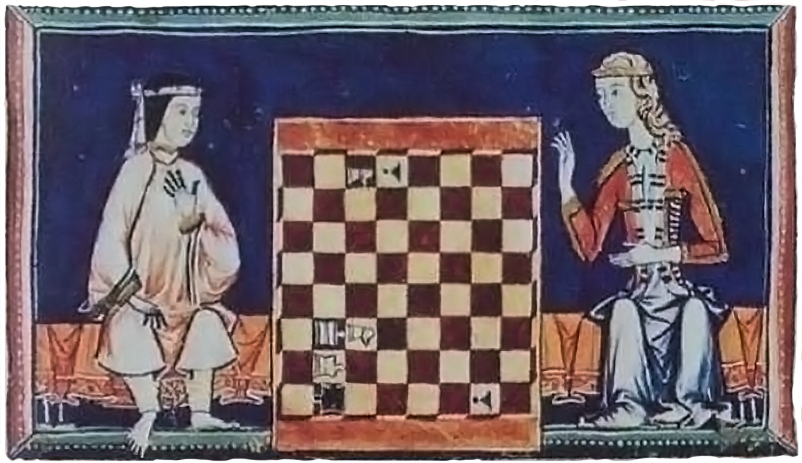

Bishop Cyril of Alexandria
This is the first of three posts all of which deal with one series of events. The series of events leading to the murder of the pagan philosopher and scientist Hypatia by a Christian mob in Alexandria in 425 C.E. She was, however, but collateral damage in a much more important struggle; that of secular versus religious authority. Nevertheless, her death sealed the victory of religious authority, since after this the Prefect, Orestes, gives up his struggle against Bishop Cyril, he gradually fades from political life, and finally disappears from historical record altogether. Where he went, what he did in later life, where, when and how he died, we don’t know.
The text is from the Christian historiographer Socrates Scholasticus’s Historia Ecclesiastica. He was born in Constantinople c. 380 C.E. and died some time after 439. The full text of Historia Ecclesiastica in English translation can be found here.
Chapter XIII.—Conflict between the Christians and Jews at Alexandria: and breach between the Bishop Cyril and the Prefect Orestes.
About this same time it happened that the Jewish inhabitants were driven out of Alexandria by Cyril the bishop on the following account. The Alexandrian public is more delighted with tumult than any other people: and if at any time it should find a pretext, breaks forth into the most intolerable excesses; for it never ceases from its turbulence without bloodshed. It happened on the present occasion that a disturbance arose among the populace, not from a cause of any serious importance, but out of an evil that has become very popular in almost all cities, viz. a fondness for dancing exhibitions.
In consequence of the Jews being disengaged from business on the Sabbath, and spending their time, not in hearing the Law, but in theatrical amusements, dancers usually collect great crowds on that day, and disorder is almost invariably produced. And although this was in some degree controlled by the governor of Alexandria, nevertheless the Jews continued opposing these measures. And although they are always hostile toward the Christians they were roused to still greater opposition against them on account of the dancers. When therefore Orestes the prefect was publishing an edict—for so they are accustomed to call public notices—in the theatre for the regulation of the shows, some of the bishop Cyril’s party were present to learn the nature of the orders about to be issued. There was among them a certain Hierax, a teacher of the rudimental branches of literature, and one who was a very enthusiastic listener of the bishop Cyril’s sermons, and made himself conspicuous by his forwardness in applauding.
When the Jews observed this person in the theatre, they immediately cried out that he had come there for no other purpose than to excite sedition among the people. Now Orestes had long regarded with jealousy the growing power of the bishops, because they encroached on the jurisdiction of the authorities appointed by the emperor, especially as Cyril wished to set spies over his proceedings; he therefore ordered Hierax to be seized, and publicly subjected him to the torture in the theatre.
Cyril, on being informed of this, sent for the principal Jews, and threatened them with the utmost severities unless they desisted from their molestation of the Christians. The Jewish populace on hearing these menaces, instead of suppressing their violence, only became more furious, and were led to form conspiracies for the destruction of the Christians; one of these was of so desperate a character as to cause their entire expulsion from Alexandria; this I shall now describe. Having agreed that each one of them should wear a ring on his finger made of the bark of a palm branch, for the sake of mutual recognition, they determined to make a nightly attack on the Christians.
They therefore sent persons into the streets to raise an outcry that the church named after Alexander was on fire. Thus many Christians on hearing this ran out, some from one direction and some from another, in great anxiety to save their church. The Jews immediately fell upon and slew them; readily distinguishing each other by their rings.
At daybreak the authors of this atrocity could not be concealed: and Cyril, accompanied by an immense crowd of people, going to their synagogues—for so they call their house of prayer—took them away from them, and drove the Jews out of the city, permitting the multitude to plunder their goods. Thus the Jews who had inhabited the city from the time of Alexander the Macedonian were expelled from it, stripped of all they possessed, and dispersed some in one direction and some in another. One of them, a physician named Adamantius, fled to Atticus bishop of Constantinople, and professing Christianity, some time afterwards returned to Alexandria and fixed his residence there.
But Orestes the governor of Alexandria was filled with great indignation at these transactions, and was excessively grieved that a city of such magnitude should have been suddenly bereft of so large a portion of its population; he therefore at once communicated the whole affair to the emperor. Cyril also wrote to him, describing the outrageous conduct of the Jews; and in the meanwhile sent persons to Orestes who should mediate concerning a reconciliation: for this the people had urged him to do. And when Orestes refused to listen to friendly advances, Cyril extended toward him the book of gospels,believing that respect for religion would induce him to lay aside his resentment. When, however, even this had no pacific effect on the prefect, but he persisted in implacable hostility against the bishop, the following event afterwards occurred.1
1Socrates and Sozomenus, Ecclesiastical Histories, ed. and trans. Philip Schaff, WM. B. Eerdmans Publishing Company, Michigan, p. 159-160
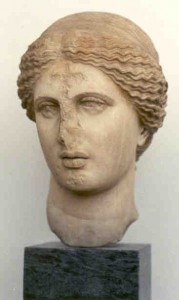

The head of a statue of Aphrodite with some Christian improvements
Libanius (ca. 314 – ca. 394 C.E.) was a Greek-speaking teacher of rhetoric of the Sophist school. Libanius was a friend of the emperor Julian II (later called The Apostate), with whom some correspondence survives, and in whose memory he wrote a series of orations; they were composed between 362 and 365. Libanius remained a pagan, though this did not stop him cultivating long-lasting friendships with Christians, both as private individuals and as imperial officials. In 386 he wrote an oration addressed to the Emperor Theodosius I, ‘complaining about gangs of monks who wandered the Syrian countryside demolishing pagan shrines and terrorizing peasants.’1 Addressing such an oration to Theodosius was a delicate, not to say dangerous thing to do, but poor Libanius, despite all evidence to the contrary, seemed to have still have harboured some hope for religious toleration if not actual freedom. In 391 Theodosius forbade on pain of prescription of property, torture and even death, the practising of any religion other than Christianity, or even visiting the temples, which he closed down, giving some of the buildings over to various bishoprics. In 386 however, he had not yet gone so far. Sacrificing was forbidden, but praying or worshipping with incense was not.
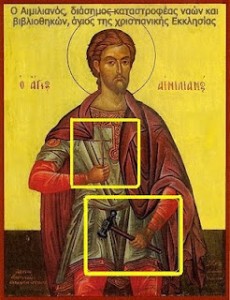
Saint Aemilianus holding the hammer he used on statues and temples
I shall, indeed, appear to many to undertake a matter full of danger in pleading with you for the temples, that they may suffer no injury, as they now do. But they who have such apprehensions seem to me to be very ignorant of your true character. For I esteem it the part of an angry and severe disposition, for any one to resent the proposal of counsel which he does not approve of: but the part of a mild and gentle and equitable disposition, such as yours2 is, barely to reject counsel not approved of. For when it is in the power of him to whom the address is made to embrace any counsel or not, it is not reasonable to refuse a hearing which can do no harm; nor yet to resent and punish the proposal of counsel, if it appear contrary to his own judgement; when the only thing that induced the adviser to mention it, was a persuasion of its usefulness.
…
After his death3 in Persia, the liberty of sacrificing remained for some tim e: but at the instigation of some innovators, sacrifices were forbidden by the two brothers4, but not incense;—-which state of things your law has ratified. So that we have not more reason to be uneasy for what is denied us, than to be thankful for what is allowed. You, therefore, have not ordered the temples to be shut up, nor forbidden any to frequent them: nor have you driven from the temples or the altars, fire or frankincense, or other honours of incense. But those black-garbed people5, who eat more than elephants, and demand a large quantity of liquor from the people who send them drink for their chantings, but who hide their luxury by their pale artificial countenances,—-these men, O Emperor, even whilst your law is in force, run to the temples, bringing with them wood, and stones, and iron, and when they have not these, hands and feet. Then follows a Mysian prey6, the roofs are uncovered, walls are pulled down, images are carried off, and altars are overturned: the priests all the while must be silent upon pain of death. When they have destroyed one temple they run to another, and a third, and trophies are erected upon trophies: which are all contrary to [your] law. This is the practice in cities, but especially in the countries. And there are many enemies every where. After innumerable mischiefs have been perpetrated, the scattered multitude unites and comes together, and they require of each other an account of what they have done; and he is ashamed who cannot tell of some great injury which he has been guilty of. They, therefore, spread themselves over the country like torrents, wasting the countries together with the temples: for wherever they demolish the temple of a country, at the same time the country itself is blinded, declines, and dies.
e: but at the instigation of some innovators, sacrifices were forbidden by the two brothers4, but not incense;—-which state of things your law has ratified. So that we have not more reason to be uneasy for what is denied us, than to be thankful for what is allowed. You, therefore, have not ordered the temples to be shut up, nor forbidden any to frequent them: nor have you driven from the temples or the altars, fire or frankincense, or other honours of incense. But those black-garbed people5, who eat more than elephants, and demand a large quantity of liquor from the people who send them drink for their chantings, but who hide their luxury by their pale artificial countenances,—-these men, O Emperor, even whilst your law is in force, run to the temples, bringing with them wood, and stones, and iron, and when they have not these, hands and feet. Then follows a Mysian prey6, the roofs are uncovered, walls are pulled down, images are carried off, and altars are overturned: the priests all the while must be silent upon pain of death. When they have destroyed one temple they run to another, and a third, and trophies are erected upon trophies: which are all contrary to [your] law. This is the practice in cities, but especially in the countries. And there are many enemies every where. After innumerable mischiefs have been perpetrated, the scattered multitude unites and comes together, and they require of each other an account of what they have done; and he is ashamed who cannot tell of some great injury which he has been guilty of. They, therefore, spread themselves over the country like torrents, wasting the countries together with the temples: for wherever they demolish the temple of a country, at the same time the country itself is blinded, declines, and dies.
…
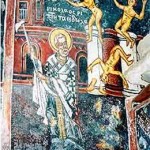
This is saint Nicholas. Yes, the same one that supposedly brings Christmas presents.
This being the state of things, the husbandman is impoverished, and the revenue suffers. For, be the will ever so good, impossibilities are not to be surmounted. Of such mischievous consequence are the arbitrary proceedings of those persons in the country, who say, ‘they fight with the temples.’ But that war is the gain of those who oppress the inhabitants: and robbing these miserable people of their goods, and what they had laid up of the fruits of the earth for their sustenance, they go off as with the spoils of those whom they have conquered. Nor are they satisfied with this, for they also seize the lands of some, saying it is sacred: and many are deprived of their paternal inheritance upon a false pretence. Thus these men riot upon other people’s misfortunes, who say they worship God with fasting. And if they who are abused come to the pastor in the city, (for so they call a man who is not one of the meekest,) complaining of the injustice that has been done |79 them, this pastor commends these, but rejects the others, as if they ought to think themselves happy that they have suffered no more. Although, O Emperor, these also are your subjects, and so much more profitable than those who injure them, as laborious men are than the idle: for they are like bees, these like drones. Moreover, if they hear of any land which has any thing that can be plundered, they cry presently, ‘Such an one sacrificeth, and does abominable things, and an army ought to be sent against him.’ And presently the reformers are there: for by this name they call their depredators, if I have not used too soft a word. Some of these strive to conceal themselves and deny their proceedings; and if you call them robbers, you affront them. Others glory and boast, and tell their exploits to those who are ignorant of them, and say they are more deserving than the husbandmen. Nevertheless, what is this but in time of peace to wage war with the husbandmen? For it by no means lessens these evils that they suffer from their countrymen. But it is really more grievous to suffer the things which I have mentioned in a time of quiet, from those who ought to assist them in a time of trouble. For you, O Emperor, in case of a war collect an army, give out orders, and do everything suitable to the emergency. And the new works which you now carry on are designed as a further |80 security against our enemies, that all may be safe in their habitations, both in the cities and in the country: and then if any enemies should attempt inroads, they may be sensible they roust suffer loss rather than gain any advantage. How is it, then, that some under your government disturb others equally under your government, and permit then not to enjoy the common benefits of it? How do they not defeat your own care and providence and labours, O Emperor? How do they not fight against your law by what they do?7
…
Good questions. Unfortunately for Libanius, and the rest of the world, (I’m with Gore Vidal on this one), Theodosius’s subsequent laws make the answers to them quite obvious.
1Gaddis, Michael, There is no crime for those who have Christ: Religious Violence in the Christian Roman Empire, University of California Press, 2005, p. 210.
2This is the emperor who, in 390, as retaliation for an uprising against the local Magister Militum, exploded in a fit of rage and ordered what is now known as the Massacre of Thessalonica, in which several thousand civilians, men, women and children were killed, indiscriminately. The lowest contemporary estimate is 7,000, the highest 15,000 dead.
3Julian II “the Apostate”.
4Emperors Valentinian and Valens.
6This proverbial expression took its rise from the Mysians, who, in the absence of their king Telepbus, being plundered by their neighbours, made no resistance. Hence it came to be applied to any persons who were passive under injuries.
7Libanius, Oration 30: For the Temples (pro Templis), in Dr Lardner’s, Heathen Testimonies, Thomas Rodd in London, 1830, pp. 72-96.

 Pope Saint Damasus I was the bishop of Rome from 366 to 384 C.E. He succeeded to the papacy amidst intense factional violence. His rival, Ursinus, was elected simultaneously, which let to such violence and bloodshed that eventually the intervention of Emperor Valentinian I was required in order to quell it. Ursinus had the support of the plebeians, while Pope Damasus was exceedingly popular with the aristocracy, and in particular the great ladies, which led to his enemies calling him Auriscalpius Matronarum: the ladies’ ear-scratcher.
Pope Saint Damasus I was the bishop of Rome from 366 to 384 C.E. He succeeded to the papacy amidst intense factional violence. His rival, Ursinus, was elected simultaneously, which let to such violence and bloodshed that eventually the intervention of Emperor Valentinian I was required in order to quell it. Ursinus had the support of the plebeians, while Pope Damasus was exceedingly popular with the aristocracy, and in particular the great ladies, which led to his enemies calling him Auriscalpius Matronarum: the ladies’ ear-scratcher.
To put all this in context, emperor Constantine I issued his edict of toleration of Christianity in 313 C.E.
As his successor [as prefect] came Viventius, a former court-chancellor, a just and prudent man of Pannonia, whose administration was quiet and mild, rich in an abundance of everything. But he, too, was alarmed by sanguinary outbreaks of the factions of the people, which were caused by the following affair. Damasus and Ursinus, burning with a superhuman desire of seizing the bishopric, engaged in bitter strife because of their opposing interests; and the supporters of both parties went even so far as conflicts ending in bloodshed and death. Since Viventius was able neither to end nor to diminish this strife, he was compelled to yield to its great violence, and retired to the suburbs. And in the struggle Damasus was victorious through the efforts of the party which favoured him. It is a well-known fact that in the basilica of Sicininus,1 where the assembly of the Christian sect is held, in a single day a hundred and thirty-seven corpses of the slain were found, and that it was only with difficulty that the long-continued frenzy of the people was afterwards quieted.2
1 Now Santa Maria Maggiore.
2 Ammianus Marcellinus, The History, book XXVII, trans. J.C. Rolfe, Vol 3, Loeb Classical Library, 1939, p.21.

A rather topical, I feel, piece. Do not let the context and date fool you. Not much has changed, I feel.
The time* Appian is talking about, is around the end of the Roman Social War in 91-88 B.C.E., also known as the Allied War, because it was fought between the Roman Republic and most of the rest of Italy, that is, cities which had been Rome’s allies for centuries. However, Rome had virtually complete control of the cities’ foreign policies, including their interactions with one another. Not to mention that, by the 2nd century B.C.E., between half and two-thirds of the soldiers in the Roman army came from Italian allied cities. And yet no one from these cities had Roman citizenship, which they would rather have liked to acquire, since that would also give them a greater say on the Roman Republic’s policies. The Social War was in part caused by the assassination of Marcus Livius Drusus in 91 B.C.E., since his proposed reforms would have granted Roman citizenship to the Roman Allies.

The temple of Vesta on the left, and Castor and Pollux on the right. To compare with still extant ruins click here.
About the same time* dissensions arose in the city between debtors and creditors, since the latter exacted the money due to them with interest, although an old law distinctly forbade lending on interest and imposed a penalty upon any one doing so. It seems that the ancient Romans, like the Greeks, abhorred the taking of interest on loans as something knavish, and hard on the poor, and leading to contention and enmity; and by the same kind of reasoning the Persians considered lending as having itself a tendency to deceit and lying. But, since time had sanctioned the practice of taking interest, the creditors demanded it according to custom. The debtors, on the other hand, put off their payments on the plea of war and civil commotion. Some indeed threatened to exact the legal penalty from the interest-takers.
The praetor Asellio, who had charge of these matters, as he was not able to compose their differences by persuasion, allowed them to proceed against each other in the courts, thus bringing the deadlock due to the conflict of law and custom before the judges. The lenders, exasperated that the now obsolete law was being revived, killed the praetor in the following manner. He was offering sacrifice to Castor and Pollux in the forum, with a crowd standing around as was usual at such a ceremony. In the first place somebody threw a stone at him, on which he dropped the libation-bowl and ran toward the temple of Vesta. They then got ahead of him and prevented him from reaching the temple, and after he had fled into a tavern they cut his throat. Many of his pursuers, thinking that he had taken refuge with the Vestal virgins, ran in there, where it was not lawful for men to go. Thus was Asellio, while serving as praetor, and pouring out libation, and wearing the sacred gilded vestments customary in such ceremonies, slain at the second hour of the day in the centre of the forum, in the midst of the sacrifice. The Senate offered a reward of money to any free citizen, freedom to any slave, impunity to any accomplice, who should give testimony leading to the conviction of the murders of Asellio, but nobody gave any information. The money-lenders covered up everything.1
1Appian, Histories, trans. Horace White, vol. III, Harvard University Press, 1913: Loeb Classical Library, p. 101

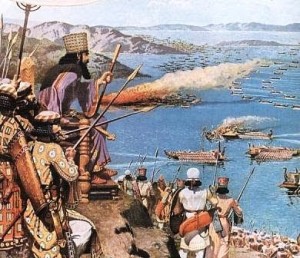 Artemisia I of Caria (fl. 480 BC) became the ruler, after the death of her husband, as a client of the Persians – who in the 5th century BC ruled as the overlords of Ionia.
Artemisia I of Caria (fl. 480 BC) became the ruler, after the death of her husband, as a client of the Persians – who in the 5th century BC ruled as the overlords of Ionia.
The Battle of Salamis was fought between an Alliance of Greek city-states and the Persian Empire in September 480 BC in the straits between the mainland and Salamis, an island in the Saronic Gulf near Athens. It marked the high-point of the second Persian invasion of Greece which had begun in 480 BC.
Although heavily outnumbered, the Greek Allies were persuaded by the Athenian general Themistocles to bring the Persian fleet to battle, in the hope that a victory would prevent naval operations against the Peloponessus. The Persian king Xerxes was also anxious for a decisive battle. As a result of subterfuge on the part of Themistocles, the Persian navy sailed into the Straits of Salamis and tried to block both entrances. In the cramped conditions of the Straits the great Persian numbers were an active hindrance, as ships struggled to manoeuvre and became disorganised. Seizing the opportunity, the Greek fleet formed in line and scored a decisive victory, sinking or capturing at least 300 Persian ships.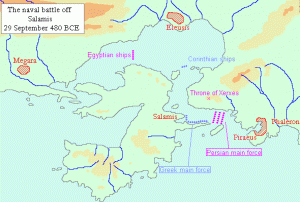
As a result Xerxes retreated to Asia with much of his army, leaving Mardonius to complete the conquest of Greece. However, the following year, the remainder of the Persian army was decisively beaten at the Battle of Plataea and the Persian navy at the Battle of Mycale. Afterwards the Persian made no more attempts to conquer the Greek mainland. These battles of Salamis and Plataea thus mark a turning point in the course of the Greco-Persian wars as a whole; from then onward, the Greek poleis would take the offensive.
Xerxes ordered a throne to be set up on the slopes of Mount Aigaleo (overlooking the straits), in order to watch the battle from a clear vantage point, and so as to record the names of commanders who performed particularly well.
Source.
7. 99 I see no need to mention any of the other captains except Artemisia. I find it a great marvel that a woman went on the expedition against Hellas: after her husband died, she took over his tyranny, though she had a young son, and followed the army from youthful spirits and manliness, under no compulsion. Artemisia was her name, and she was the daughter of Lygdamis; on her father’s side she was of Halicarnassian lineage, and on her mother’s Cretan. She was the leader of the men of Halicarnassus and Cos and Nisyrus and Calydnos, and provided five ships. Her ships were reputed to be the best in the whole fleet after the ships of Sidon, and she gave the king the best advice of all his allies.
8. 67 …[Xerxes] came and sat on his throne, and present at his summons were the tyrants of all the peoples and the company leaders from the fleet. They sat according to the honor which the king had granted each of them, first the king of Sidon, then the king of Tyre, then the rest. When they sat in order one after another, Xerxes sent Mardonius to test each by asking if they should fight at sea.
8. 68 Mardonius went about questioning them, starting with the Sidonian, and all the others were unanimous, advising to fight at sea, but Artemisia said, “Tell the king, Mardonius, that I, who neither was most cowardly in the sea battles off Euboea nor performed the least feats of arms, say this: ‘Master, it is just for me to declare my real opinion, what I consider to be best for your cause. And I say to you this: spare your ships, and do not fight at sea. Their men are as much stronger than your men by sea as men are stronger than women. Why is it so necessary for you to risk everything by fighting at sea? Do you not possess Athens, for which you set out on this march, and do you not have the rest of Hellas? No one stands in your way. Those who opposed you have received what they deserved. I will tell you how I think the affairs of your enemies will turn out: If you do not hurry to fight at sea, but keep your ships here and stay near land, or even advance into the Peloponnese, then, my lord, you will easily accomplish what you had in mind on coming here. The Hellenes are not able to hold out against you for a long time, but you will scatter them, and they will each flee to their own cities. I have learned that they have no food on this island, and it is not likely, if you lead your army against the Peloponnese, that those of them who have come from there will sit still, nor will they care to fight at sea for Athens. But if you hurry to fight at sea immediately, I fear that your fleet if reduced to cowardice may also injure your army on land. In addition, my King, take this to heart: Good people’s slaves tend to be base, and the slaves of the base tend to be good. You, who are best among men, have base slaves, who are accounted your allies, the Egyptians and Cyprians and Cilicians and Pamphylians, who are of no use at all.’”
8. 69 When she said this to Mardonius, all who were well disposed towards Artemisia lamented her words, thinking she would suffer some ill from the king because she advised against fighting at sea. Those who were jealous and envied her, because she was given honor among the chief of all the allies, were glad at her answer, thinking she would be killed. But when the counsels were reported to Xerxes, he was greatly pleased by Artemisia’s opinion. Even before this he had considered her of excellent character, and now he praised her much more highly. Still he ordered that the majority be obeyed, for he believed that at Euboea they had purposely fought badly because he was not there. This time he had made preparations to see the battle in person.
8. 87 I cannot say exactly how each of the other barbarians or Hellenes fought, but this is what happened to Artemisia, and it gave her still higher esteem with the king: When the king’s side was all in commotion, at that time Artemisia’s ship was pursued by a ship of Attica. She could not escape, for other allied ships were in front of her and hers was the nearest to the enemy. So she resolved to do something which did in fact benefit her: as she was pursued by the Attic ship, she charged and rammed an allied ship, with a Calyndian crew and Damasithymus himself, king of the Calyndians, aboard. I cannot say if she had some quarrel with him while they were still at the Hellespont, or whether she did this intentionally or if the ship of the Calyndians fell in her path by chance. But when she rammed and sank it, she had the luck of gaining two advantages. When the captain of the Attic ship saw her ram a ship with a barbarian crew, he decided that Artemisia’s ship was either Hellenic or a deserter from the barbarians fighting for them, so he turned away to deal with others.
8. 88 Thus she happened to escape and not be destroyed, and it also turned out that the harmful thing which she had done won her exceptional esteem from Xerxes. It is said that the king, as he watched the battle, saw her ship ram the other, and one of the bystanders said, “Master, do you see how well Artemisia contends in the contest and how she has sunk an enemy ship?” When he asked if the deed was truly Artemisia’s, they affirmed it, knowing reliably the marking of her ship, and they supposed that the ruined ship was an enemy. As I have said, all this happened to bring her luck, and also that no one from the Calyndian ship survived to accuse her. It is said that Xerxes replied to what was told him, “My men have become women, and my women men.” They say this is what Xerxes said.
8. 89 In this struggle the general Ariabignes died, son of Darius and the brother of Xerxes. Many other famous men of the Persians and Medes and other allies also died, but only a few Hellenes, since they knew how to swim. Those whose ships were sunk swam across to Salamis, unless they were killed in action, but many of the barbarians drowned in the sea since they did not know how to swim. Most of the ships were sunk when those in the front turned to flee, since those marshalled in the rear, as they tried to go forward with their ships so they too could display some feat to the king, ran afoul of their own side’s ships in flight.
8. 91 The barbarians were routed and tried to flee by sailing out to Phalerum, but the Aeginetans lay in wait for them in the strait and then performed deeds worth telling. The Athenians in the commotion destroyed those ships which either resisted or tried to flee, the Aeginetans those sailing out of the strait. Whoever escaped from the Athenians charged right into the Aeginetans.
8. 93 In this battle the Hellenes with the reputation as most courageous were the Aeginetans, then the Athenians. Among individuals they were Polycritus the Aeginetan and the Athenians Eumenes of Anagyrus and Aminias of Pallene, the one who pursued Artemisia. If he had known she was in that ship, he would not have stopped before either capturing it or being captured himself. Such were the orders given to the Athenian captains, and there was a prize offered of ten thousand drachmas to whoever took her alive, since they were indignant that a woman waged war against Athens. But she escaped, as I said earlier, and the others whose ships survived were also in Phalerum.
8. 101 When [Xerxes] consulted with those Persians whom he summoned, he resolved to send for Artemisia as well, because he saw that she alone at the former sitting had discerned what was best to do. When Artemisia came, Xerxes bade all others withdraw, both Persian councillors and guards, and said to her: “It is Mardonius’s advice that I should follow here and attack the Peloponnese, for the Persians, he says, and the land army are not to blame for our disaster; of that they would willingly give proof. Therefore he advises me to do this, or else he offers to choose three hundred thousand men of the army and deliver Hellas to me enslaved, while I myself by his counsel march homeward with the rest of the host. Now I ask of you, seeing that you correctly advised me against the late sea-fight, counsel me as to which of these two things would be best for me to do.”
8. 102 When she was asked for advice, she replied: “It is difficult, O king, to answer your plea for advice by saying that which is best, but in the present turn of affairs I think it best that you march back and that Mardonius, if he so wishes and promises to do as he says, be left here with those whom he desires. For if he subdues all that he offers to subdue and prospers in his design, the achievement, Sire, is yours since it will be your servants who have accomplished it. If, on the other hand, the issue is contrary to Mardonius’s expectation, it is no great misfortune so long as you and all that household of yours are safe; for while you and the members of your household are safe, many a time will the Greeks have to fight for their lives. As for Mardonius, if any disaster befalls him, it is does not much matter, nor will any victory of the Greeks be a real victory when they have but slain your servant. As for you, you will be marching home after the burning of Athens, which thing was the whole purpose of your expedition.”
8. 103 Artemisia’s counsel pleased Xerxes, for it happened that she spoke what he himself had in mind. In truth, I think that he would not have remained even if all men and women had counselled him so to do—so panic-stricken was he. Having then thanked Artemisia, he sent her away to take his sons to Ephesus, for he had some bastard sons with him.
Herodotus, Histories, with an English translation by A. D. Godley. Cambridge. Harvard University Press. 1920.















